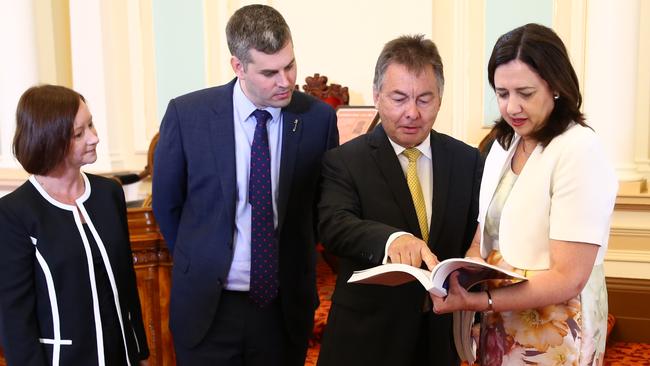Queensland parole: More backing for GPS tracking of offenders
THE Corrective Services unit tracking offenders fitted with GPS devices will be expanded by 24 staff after reforms were introduced into Parliament.

Crime & Justice
Don't miss out on the headlines from Crime & Justice. Followed categories will be added to My News.
THE Corrective Services unit tracking offenders fitted with GPS devices will be expanded by 24 staff after reforms were yesterday introduced into Parliament.
The State Government accepted a recommendation of the Sofronoff review into the state’s parole system, which would give the parole board discretion to fit GPS tracking devices to high-risk parolees. The previous system allowed only those convicted of sexual offences to be tracked.
The $265 million reform package also includes 243 extra parole and probation officers to manage the increased workload.
The Courier-Mail can reveal the unit, which tracks sex offenders, will receive an extra 24 staff to monitor other parolees, in real time, under the new rules.
Queensland Corrective Services will buy 510 devices. The monitoring program will cost $35 million over six years to run.
Corrective Services Minister Mark Ryan said expanding the use of GPS tracking devices would make monitoring parolees more effective and efficient.
“It’s using technology to improve community safety,” he said.
Under the reforms, Queensland’s three parole boards will be merged into one and its members will be required to hold more professional qualifications. Michael Byrne QC has been named the parole board’s president-designate, with the role taking effect when the law is passed.
The man who led the review, former solicitor-general Walter Sofronoff QC, said the parole system had relied on boards “consisting of part-time amateurs” since 1937, and the reforms were needed to improve professionalism.
The Government also adopted a recommendation for a “no body, no parole” rule, a policy the Opposition announced last year. Two of the 91 recommendations were not accepted. They involved winding back mandatory sentencing and reviewing policies about the placement of some sexual offenders and convicted murderers to allow them to serve time in low-security facilities.
Opposition spokesman on Corrective Services Tim Mander said he was concerned Labor would take too long to implement the parole reforms.


